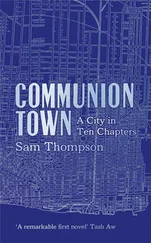Frank Tallis - Deadly Communion
Здесь есть возможность читать онлайн «Frank Tallis - Deadly Communion» весь текст электронной книги совершенно бесплатно (целиком полную версию без сокращений). В некоторых случаях можно слушать аудио, скачать через торрент в формате fb2 и присутствует краткое содержание. Жанр: Исторический детектив, на английском языке. Описание произведения, (предисловие) а так же отзывы посетителей доступны на портале библиотеки ЛибКат.
- Название:Deadly Communion
- Автор:
- Жанр:
- Год:неизвестен
- ISBN:нет данных
- Рейтинг книги:3 / 5. Голосов: 1
-
Избранное:Добавить в избранное
- Отзывы:
-
Ваша оценка:
- 60
- 1
- 2
- 3
- 4
- 5
Deadly Communion: краткое содержание, описание и аннотация
Предлагаем к чтению аннотацию, описание, краткое содержание или предисловие (зависит от того, что написал сам автор книги «Deadly Communion»). Если вы не нашли необходимую информацию о книге — напишите в комментариях, мы постараемся отыскать её.
Deadly Communion — читать онлайн бесплатно полную книгу (весь текст) целиком
Ниже представлен текст книги, разбитый по страницам. Система сохранения места последней прочитанной страницы, позволяет с удобством читать онлайн бесплатно книгу «Deadly Communion», без необходимости каждый раз заново искать на чём Вы остановились. Поставьте закладку, и сможете в любой момент перейти на страницу, на которой закончили чтение.
Интервал:
Закладка:
‘The black hair is thicker.’
‘And the tip of each hair?’
‘The black hair is sharper — the blonde hair more rounded.’
‘Now the cuticle. Can you see the scales?’
Amelia increased the magnification.
‘Yes.’
‘Are there differences in scale size — or distribution?’
‘No.’
‘Now the bulb. Although the bulb has fewer differentiating features than the shaft, it can also provide us with very valuable information. A plump bulb — and the presence of traces of the ruptured hair sheath — is typical of a healthy hair that has been detached by force, while a shrunken and wrinkled bulb — without any sheath — is typical of dead or diseased hairs.’
‘Herr professor?’
Amelia’s voice contained a note of excitement.
‘Yes.’
‘There is something rather odd … a reflection perhaps.’ She changed the position of the lamp without lifting her head. ‘No. It is not a reflection. How strange.’
‘What is?’
‘The black hair. The shaft is entirely black — but just above the bulb … it is blonde.’
‘May I see?’
Amelia stepped aside and allowed Professor Mathias to look down the barrel of the microscope.
‘It has been dyed.’
‘Oh …’ said Amelia.
‘You sound disappointed, Miss Lydgate.’
Mathias turned to look at her.
‘I was hoping,’ said Amelia, ‘that we had chanced upon a piece of useful evidence, a hair from the head of the perpetrator. But now we must suppose that this hair belongs to another female entertainer.’
‘Must we?’ said the professor.
40
After attending Professor Mathias’s autopsy Rheinhardt had returned to Loiberger’s. He had visited the coffee house earlier in the day, but it had been closed and a sign in the window had informed him that the establishment would not be open again until six; however, it was nearly half past that hour when a man appeared, striding down the middle of the street, jingling a set of keys in his hand. He was a portly fellow, with a round face and snub nose, which, taken together with his black curly hair and steel-rimmed glasses, made him look very much — so Rheinhardt thought — like Schubert.
‘Herr Loiberger?’
‘Yes,’ said the man. ‘I’m Loiberger.’ Then he laughed, for no apparent reason.
‘Inspector Reinhardt — security office. May I come in?’
‘Of course. My regulars won’t be here for hours yet.’ Again, the laugh. It didn’t seem to be a nervous laugh but merely a welling-up of good humour.
Loiberger unlocked the door and pushed it open.
‘Please sit down, inspector. I’ll get you something to drink.’
‘That won’t be necessary.’
‘No, I insist. You look as though you’ve been waiting. You must be cold.’
For once, Rheinhardt didn’t object. The day — which had started so early — was beginning to catch up with him. Loiberger disappeared through a doorway behind a counter piled high with pyramids of Turkish delight and punschkrapfen. Rheinhardt sat at a window table and looked around the dark interior. It was a shabby little coffee house. Yet it had a certain bohemian charm. The walls were hung with Venetian carnival masks and photographs of famous actors. A bust of Goethe stood on a pedestal outside the toilets.
Loiberger returned with a tray on which he balanced a bottle of schnapps and two shot glasses. He took the seat opposite Rheinhardt and poured the drinks.
‘Thank you,’ said Rheinhardt. ‘You are most kind.’
‘Prost!’ said Loiberger, raising the glass before throwing his head back and emptying the contents down his throat.
‘Prost!’ returned Rheinhardt.
It was good schnapps.
‘So, inspector,’ said Loiberger, refilling the glasses. ‘How can I help?’
‘Do you know who Cacilie Roster is?’
‘Yes, of course. She’s one of my regulars.’
‘When was the last time you saw her?’
‘Last night. She stayed late — as usual. And left just after midnight.’
‘Was she with anyone?’
Loiberger laughed: ‘Was she with someone? She’s always with someone. She caused a stir last week by arriving with two giants. I’m not joking, inspector, two giants.’
‘I believe you,’ said Rheinhardt. ‘But last night, Herr Loiberger. If you could try to remember who she was with last night?’
‘A gentleman …’
‘What did he look like?’
‘A handsome fellow: high cheekbones and very bright eyes.’
‘Blue?’
‘I think so. Yes. I assumed he was a performer.’
‘Do you remember the colour of his hair?’
‘Black.’
‘Did you serve him?’
‘Yes.’
Rheinhardt paused.
‘Herr Loiberger, I am sure that my next question will strike you as rather peculiar. But I would be most grateful if you would give it your most serious consideration. What did this man smell like?’
Herr Loiberger gave the question a moment’s thought, and then burst out laughing. ‘Really, inspector …’
41
Frau Harrer arrived at Rainmayr’s studio with her two daughters, Franzel and Gusti. She was about to follow them inside when Rainmayr stopped her with a raised finger.
‘I’d rather you didn’t. There’s no need.’ Before Frau Harrer could object, he produced some coins and pressed them into her moist palm. ‘You can expect more, in due course.’
She took the money and called after the girls: ‘Franzel, Gusti. Do whatever Herr Rainmayr says. Understand?’
Rainmayr had first seen Frau Harrer and her daughters in a queue, waiting to be given a free bowl of soup by workers from a women’s charity, and had offered to buy them a more substantial meal in a nearby coffee house. Frau Harrer had not required much persuading and while she and her daughters were bolting down their food Rainmayr had made his proposal. He was never in any doubt that Frau Harrer would accept.
‘Come back this afternoon,’ said Rainmayr, closing the door.
The two girls stood awkwardly in the middle of the studio. The eldest, Franzel, was probably about fifteen. She had long straight hair and sharp angular features. Gusti, who Rainmayr judged to be a year younger, was obviously related, although her face was less severe.
‘Now,’ said Rainmayr, clapping his hands together. ‘Go behind that screen and take off your clothes.’
‘All of them?’ asked Franzel.
‘Yes.’
‘But it’s cold.’
‘Don’t worry about that, I’ll light the stove in a minute. Besides, you won’t be entirely naked. I have some new clothes I want you to wear. Pretty clothes.’
He had learned from experience that a businesslike manner was more likely to produce compliance.
The two girls went behind the screen and Rainmayr rummaged in a bag for some garments and accessories. It was a condition laid down by his patron that the commission he was about to begin work on should feature ‘partially clothed models of youthful appearance’.
Franzel stepped out first, her arms positioned to cover her breasts and genitals. She glanced at Rainmayr nervously, before hissing at her sister: ‘Come on — you have to.’ Gusti appeared a few moments later. Her head was bowed and she was looking at her feet.
‘Over here, you two. Don’t be shy.’
They crossed the floor, leaving a trail of footprints in the charcoal dust. Rainmayr’s eye was immediately drawn to their jutting hip bones and skeletal prominences. Their skin was perfect for his purposes: white and transparent enough to offer tantalising glimpses of internal structures. For Rainmayr, nudity was not simply about the removal of clothing. His aesthetic sensibility demanded a form of nudity that advanced one step further, satisfying a need for deeper and deeper levels of exposure. Not every model could be naked in the way that Rainmayr wanted. The opaque exterior of a well-fed woman held no interest for him.
Читать дальшеИнтервал:
Закладка:
Похожие книги на «Deadly Communion»
Представляем Вашему вниманию похожие книги на «Deadly Communion» списком для выбора. Мы отобрали схожую по названию и смыслу литературу в надежде предоставить читателям больше вариантов отыскать новые, интересные, ещё непрочитанные произведения.
Обсуждение, отзывы о книге «Deadly Communion» и просто собственные мнения читателей. Оставьте ваши комментарии, напишите, что Вы думаете о произведении, его смысле или главных героях. Укажите что конкретно понравилось, а что нет, и почему Вы так считаете.












